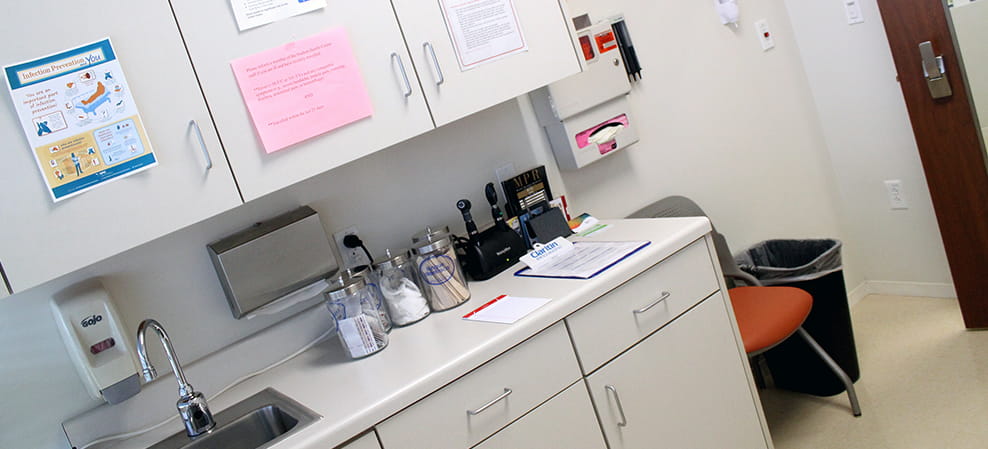Student Services

Clinical Services
Our clinical services provide for both primary and preventative healthcare and include the following:
- Treatment of chronic stabilized diseases (copy of medical record and current treatment is required)
- Hypertension
- Hypothyroidism
- Hypercholesterolemia
- Non-insulin dependent diabetes
- Asthma
- Diagnosis and treatment of general medical illnesses.
- Minor emergency care.
- Routine check-up and sports physicals (some restrictions may apply)
- Immunizations (flu, meningitis, tetanus, etc.)*
- Human Papillomavirus Vaccine (HPV) (recommended for everyone ages 9-26 and ages 27-45, based on discussions with a healthcare provider).
- TB Tests (PPD and IGRA)
- STD screening and treatment.
- Pelvic exams.
- Birth control.
- Pregnancy counseling.
- Referrals for x-ray, ultrasound, MRI and other specialized tests.
- Laboratory testing for diagnostic purposes.
- Allergy injections.
- Students may be referred to outside medical providers for more serious problems that exceed the center’s capabilities.
- *I-693 Vaccination Requirements: Must be evaluated by civil surgeon prior to receiving any vaccines, other than COVID-19. Do not attempt to meet the vaccination requirements in case any of the required vaccines are not medically appropriate for you. You will have the option to ask your family doctor to administer those vaccines to you after your evaluation by the civil surgeon.
Pelvic Exam for Women
Dental Services
In partnership with Canyon Creek Dentistry, we offer free dental screenings for currently enrolled students. A dental hygienist is present at every screening and performs and inspection of the teeth and gums. At the end of each screening, the student is provided a proposed treatment plan. For more information or to schedule an appointment, contact the SHC at 972-883-2747 or visit our Oral Health page.
Medical Excuse Policy
The SHC does not provide excuses for missed classes. This matter is between you and your professor.
Patient Visits
What is a Physical Exam?
A physical exam is a routine check your primary care provider (PCP) performs to assess your overall health. A PCP may be a doctor, a nurse practitioner or a physician assistant. The exam is also known as a wellness check. You don’t have to be sick to request an exam. The physical exam can be a good time to ask your PCP questions about your health or discuss any changes or problems that you have noticed.
There are different tests that may be performed during your physical exam. Depending on your age or medical or family history, your PCP may recommend additional testing.
What’s the Purpose of an Annual Physical Exam?
A physical examination helps your PCP to determine the general status of your health. The exam also gives you a chance to talk to them about any ongoing pain or symptoms that you’re experiencing or any other health concerns that you might have. A physical exam is recommended at least once per year, especially in people over the age of 50.
Annual physical exams are used to:
• Check for possible diseases so they can be treated early.
• Identify any issues that may become medical concerns in the future.
• Ensure that you are maintaining a healthy diet and exercise routine.
• Build a relationship with your PCP.
How is a Physical Exam Performed?
Before meeting with your PCP, a nurse will ask you a series of questions about your medical history, including any allergies, past surgeries or symptoms you might have. They may also ask about your lifestyle, including if you exercise, smoke or drink alcohol.
Your PCP will usually begin the exam by inspecting your body for unusual marks or growths. You may sit or stand during this part of the exam. Next, they may have you lie down and will feel your abdomen and other parts of your body. When doing this, your PCP is inspecting the consistency, location, size, tenderness and texture of your vital organs.
Your PCP will use a stethoscope to listen your heart and lungs, to make sure there are no abnormal sounds. Your PCP also will check your height, weight and pulse (including whether your pulse is too slow or too fast).
A genital exam is a part of the routine physical exam. For females, the genital exam is done as a part of the women’s annual exam.
While you can always contact your PCP as needed, your physical exam is your time to ask questions about anything health related. If you don’t understand any test that your PCP is doing, don’t hesitate to ask questions.
Following Up After a Physical Exam
After the appointment, you are free to go about your day. Your PCP may follow up after the exam via phone call or email. They will generally provide you with a copy of your test results and carefully review your report. Your PCP will point out any problem areas and tell you steps you should take to help yourself, if needed. Depending on what your PCP finds, you may need other tests or screenings later.
If no additional tests are needed and no health problems arise, you are set until next year
